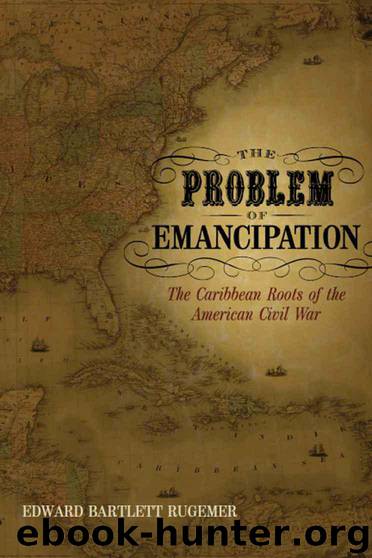The Problem of Emancipation: The Caribbean Roots of the American Civil War by Edward Bartlett Rugemer

Author:Edward Bartlett Rugemer [Rugemer, Edward Bartlett]
Language: eng
Format: epub
Tags: History, General, Slaves, Social Science, United States, Slavery, Civil War Period (1850-1877), Political Science, 19th Century, Antislavery Movements, Caribbean & West Indies, International Relations, West Indies
ISBN: 9780807135594
Google: bB6APwAACAAJ
Amazon: 0807135593
Barnesnoble: 0807135593
Publisher: Louisiana State University Press
Published: 2009-08-01T07:00:00+00:00
7
Rethinking Liberty
On August 1, 1849, African Americans in Columbus, Ohio, gathered to commemorate Britain’s abolition of slavery in the West Indian colonies. The celebration had been planned months in advance, and while only the published toasts have survived (thanks to Frederick Douglass), accounts of celebrations in other communities suggest a program that would have been familiar to abolitionist communities throughout the country. The day often began with a procession through the major streets to a church or to a wooded grove on the outskirts of town. Here there would be a solemn reading of the British Parliament’s Act of Abolition and, perhaps, the Declaration of Independence, and then there would be prayers, songs, a series of orations, and a picnic. Later in the evening organizers often held a private dinner, the occasion for toasts. By 1849 American abolitionists had been celebrating the First of August for eleven years, and Douglass’s omission of such familiar details indicates his astute editorial selection of the most newsworthy information. The toasts were indeed remarkable.1
They began with “the 1st of August, the day we commemorate,” an acknowledgment of the day in 1834 when Parliament’s decree of abolition was enacted in the West Indies. This traditional first toast was a conscious echo of “the day we celebrate,” the toast that had led white celebrations of the Fourth of July since at least the turn of the century. But there the resonance with the traditional American rite ended, for the toasts that followed trumpeted a radical abolitionism that cut to the hollow heart of white America’s celebration of its love of freedom. “Slaveholding Christians” were damned as the “legitimate heirs and faithful commissaries of Satan.” They condemned the war with Mexico as a “Slave-holding scheme,” which had extended the “area of Despotism.” They toasted Joshua Giddings and all others who “contend for the colored man’s rights.” But the most incredible toast was to “Nathaniel Turner, Cinque, and Madison Washington—They were great and mighty men; competent to lead the oppressed to Liberty: let us perpetuate their memory.”2
It is hard to imagine a more radical toast in antebellum America. Most white Americans knew Nathaniel Turner by the more common—and diminutive—“Nat.” They said he was the deranged lunatic whose hallucinations had inspired the bloody insurrection in Southampton, Virginia. When African Americans offered a formal toast in honor of Turner and replaced “Nat” with the proper “Nathaniel,” they endowed Turner’s leadership with a respectability generally reserved for George Washington or Lafayette. And to link Turner to the African Cinque and to Madison Washington, who had both led slave-ship rebellions off the U.S. coast within the past few years, was to commemorate the tradition of violent struggles for black freedom, an appropriate counterpoint to white America’s celebration of its violent struggle for national freedom on the Fourth of July.
The toast to Joshua Giddings was equally significant. One of the most powerful Whigs in Ohio, Giddings represented the cutting edge of political abolitionism. In 1849 Giddings was in his sixth term as a representative of Ohio in the U.
Download
This site does not store any files on its server. We only index and link to content provided by other sites. Please contact the content providers to delete copyright contents if any and email us, we'll remove relevant links or contents immediately.
| General | Discrimination & Racism |
Nudge - Improving Decisions about Health, Wealth, and Happiness by Thaler Sunstein(7693)
The Fire Next Time by James Baldwin(5431)
iGen by Jean M. Twenge(5409)
Adulting by Kelly Williams Brown(4566)
The Sports Rules Book by Human Kinetics(4379)
The Hacking of the American Mind by Robert H. Lustig(4375)
The Ethical Slut by Janet W. Hardy(4242)
Captivate by Vanessa Van Edwards(3838)
Mummy Knew by Lisa James(3686)
In a Sunburned Country by Bill Bryson(3537)
The Worm at the Core by Sheldon Solomon(3486)
Ants Among Elephants by Sujatha Gidla(3462)
The 48 laws of power by Robert Greene & Joost Elffers(3249)
Suicide: A Study in Sociology by Emile Durkheim(3018)
The Slow Fix: Solve Problems, Work Smarter, and Live Better In a World Addicted to Speed by Carl Honore(3007)
The Tipping Point by Malcolm Gladwell(2914)
Humans of New York by Brandon Stanton(2868)
Handbook of Forensic Sociology and Psychology by Stephen J. Morewitz & Mark L. Goldstein(2704)
The Happy Hooker by Xaviera Hollander(2686)
